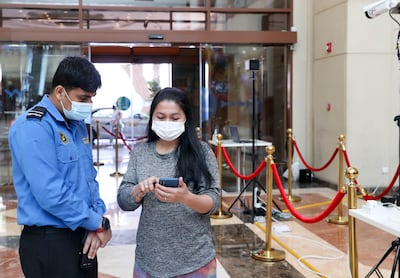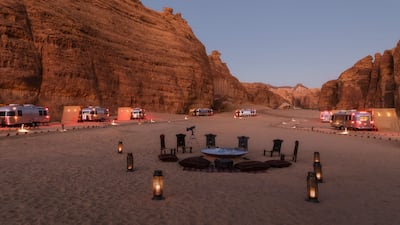Saudi Arabia has further eased Covid-19 travel restrictions for vaccinated visitors.
Travellers flying to the kingdom no longer need to take a pre-departure PCR or antigen test on arrival.
The new rules also mean that face masks are not required in outdoor places, and social-distancing measures have been relaxed.
Suspensions on 17 countries have also been lifted, with flights once again able to land in the kingdom from a host of African and Asian countries where travel was previously restricted.
The news comes after the number of coronavirus infections in Saudi Arabia dropped by nearly 50 per cent in a week. It is likely to provide a boost to the kingdom ahead of Hajj, one of Saudi Arabia's busiest times for travel, which is due to start in early July.
If you're considering taking a trip to the kingdom, here’s everything you need to know about travelling there, from which vaccines are accepted to what you need to do before setting off, the rules in place when you get there and what to add to your tourism itinerary.
Is Saudi Arabia open to tourists?

Yes, Saudi citizens and residents, GCC nationals, diplomats, health practitioners and fully vaccinated tourists can fly to Saudi Arabia.
What do I need to do before I fly to the kingdom?

Most visitors to Saudi Arabia need a tourist visa to enter. The multiple-entry e-visa is valid for a year, with tourists allowed to stay in the country for up to 90 days.
It is available online, and travellers can check if they are eligible by identifying their nationality on the dropdown list on the same website.
GCC citizens do not require a tourist visa to visit Saudi Arabia. However, GCC ID cards are not accepted for travel, and all visitors must have their passports with them to ensure entry.
Before flying, travellers must register their details, including comprehensive vaccination information, with Saudi health authorities via this online form. All tourists with a visit visa must also have insurance to cover the cost of any Covid-19 medical treatment during their trip.
Do I need a PCR test to fly?
No, vaccinated travellers no longer need a PCR test to fly to Saudi Arabia. Previous requirements for a negative PCR test result taken no more than 72 hours before departing no longer apply.
Children under aged 18 can travel without being vaccinated or having a negative PCR test result.
Which vaccinations are recognised?

Saudi Arabia has approved four Covid-19 vaccines for entry: AstraZeneca, Pfizer-BioNTech, Moderna and Johnson & Johnson. Anyone vaccinated with Sinovac or Sinopharm can travel to the kingdom once a booster shot from one of the four recognised vaccines has also been administered.
Travellers must have received both doses of the vaccine, except for those inoculated with Johnson & Johnson, which is a single-dose shot. To be considered fully vaccinated, the final dose must have been taken at least 14 days and at most eight months before departure. If more than eight months have passed, travellers will need to have a booster shot.
All tourists must also register on the Quddum platform no less than 72 hours before flying to the kingdom.
Do I need to quarantine?

There’s no need to quarantine in Saudi Arabia as long as you’re fully vaccinated.
Upon return to the UAE, there's no quarantine necessary for travellers arriving in any emirate after the country relaxed its Covid-19 travel requirements, including dropping its green list for travel.
Unvaccinated travellers can fly to Saudi Arabia, but must undertake a five-day period of institutional quarantine at their own expense. This can be booked via the airline they are flying with at least 72 hours before departure.
Passengers who have had a single dose of a vaccine administered in the kingdom, or have been immunised with a vaccine approved by the World Health Organisation but not approved in the kingdom, should undergo a three-day quarantine period.
Will Al Hosn app work in Saudi Arabia?

The UAE’s Al Hosn app is not in use in Saudi Arabia. Instead, the kingdom uses Tawakkalna as a track-and-trace app. Visitors must download it and register their passport details.
Similar to Al Hosn, proof of vaccination on the Tawwakalna app is required for entry to many public places in the kingdom, including shopping malls, cinemas, restaurants and entertainment venues.
Which airlines are flying to the kingdom?

Several are flying between the UAE and Saudi Arabia, including Etihad Airways, Emirates, Saudia, flynas, flydubai and more.
Travellers can fly to Riyadh, Dammam, Jeddah, Madinah and AlUla direct from the UAE.
Dubai to Riyadh and Jeddah were two of the busiest routes in the world in February 2022, according to aviation data firm OAG.
What can I see and do once there?

Often called the final frontier of travel, the kingdom is huge, with plenty of things to see and do. From the bustling cities of Riyadh and Jeddah to endless sand dunes, mountain peaks and desert oases, and not to mention its thriving Red Sea coastline, the sprawling destination is unlike anywhere in the world.
“Saudi [Arabia] is the authentic home of Arabia, a destination redolent of the mystique and romance of ancient civilisations, rich in iconic locations and unexpected stories delivered with the unparalleled hospitality for which Saudi people are renowned," said Fahd Hamidaddin, chief executive of Saudi Tourism Authority.
The kingdom is massive – spanning more than 2.15 million square kilometres, it is the 13th-largest country in the world – so there's a wealth of things to do and see.
City breaks await in the capital, Riyadh, where centuries-old history sits alongside a modern metropolis, or in port-side Jeddah, with its coveted waterfront and al fresco dining or the ancient maze-like streets of Al Balad. The port city of Jazan is a good jumping-off point for the unspoilt Farasan Islands.
Al Ahsa’s cool desert springs are a good place to escape the midday sun and children will enjoy exploring one of the biggest oases in the world. Ocean lovers can go into the blue as Saudi Arabia’s coastal waters are rich in marine life and home to some of the most untouched dive sites in the world.
If it's deserts you seek, the country has dunes in droves. Pay a visit to the Rub Al Khali or Empty Quarter, a favourite with adventure-seekers, or the Great Nafud Desert, where dunes tower about 1,000 metres in height.
In Taif, mountain peaks, flower fields and ancient souqs await, or visit AlUla, one of the kingdom’s mega-projects where visitors can explore several ancient heritage sites and see the world’s largest mirrored building. You can even take in the historic region from the sky, with a newly launched helicopter tour flying travellers over the kingdom’s first Unesco-listed site.
What Covid-19 restrictions are in place?
People are no longer obliged to wear face masks in open spaces, except at sites such as the Grand Mosque in Makkah and the Prophet’s Mosque in Madinah. Face masks must still be worn in closed areas.
Social-distancing measures have been dropped in most public places.
Travellers and residents must continue to show their health status on the Tawakkalna app before being allowed into places such as cafes, hotels, restaurants, shopping malls and cinemas.























